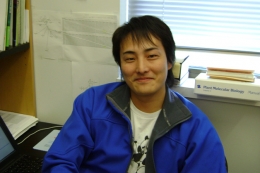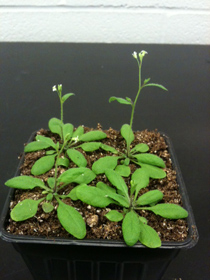Dr. Kiwamu Tanaka, an aspiring scientist, is currently doing research on Role of extracellular ATP in plant growth and development at the Division of Plant Sciences in the University of Missouri. He completed his doctoral work at The United Graduate School of Agricultural Sciences in the Kagoshima University, Japan. Recently we spoke with Dr. Tanaka to know about his research work, especially regarding the study published in Science (DOI: 10.1126/science.343.6168.290), and also about why it is important, how life as a research scientist is, and so on. So let’s hear from Dr. Tanaka:
Q. Let us start with your research topic. What is your research area? Will you please tell us a bit more on this? What did you find?
Dr. Kiwamu Tanaka: My scientific career has focused on plant-microbe interactions that can be utilized to enhance crop plant growth for agricultural purposes. Especially I had had a strong interest in biological nitrogen fixation by nodulation which is the result of a symbiosis between legume plants and special soil bacteria rhizobia. Nodulation results in the formation of a specialized organ, the nodule, where biological nitrogen fixation takes place. Given that plants cannot utilize aerial nitrogen, even though this is a primary nutrition for plants, nodulation is a great natural system by plant-microbe interaction.
While working in this research area, we found that ecto-apyrases, which are membrane-associated ATP hydrolyzing enzymes and the catalytic domain is outside the membrane, is very important for maximize nodulation, suggesting the critical importance of extracellular ATP signal during plant-microbe interactions. Therefore, it was natural for us to study extracellular ATP and look for its receptor, which was well documented in animals, but not so in plants. First, we started by looking for homologs of mammalian ATP receptors in plant genomes. However, we could not identify any of them by bioinformatics approach based on structural homology. Hence, we decided to use a forward genetic screen. Finally, as we published, we have identified an ATP receptor by pursuit of mutations that make plants insensitive to extracellular ATP.
In mammals, extracellular ATP is very important signaling molecule, which is involved in neurotransmission, inflammation, cell growth and death in our body. However, there was significant skepticism in the animal field about the role of extracellular ATP until the first receptors were identified. Likewise, there has been skepticism in the plant community about whether extracellular ATP is really important. We believe that our discovery of the plant ATP receptor will stimulate a broader investigation of how extracellular ATP functions in plants. We also think that our discovery should be of wide interest to researchers from both plant and animal sciences because it reports the first ATP receptor in plants. This not only provides strong evidence for an important signaling role for extracellular ATP in plants, but also provides an opening for extensive comparative studies between plant and animal systems.
Q. Why is this important? (i.e. why should the general public care about this?)
Dr. Kiwamu Tanaka: There have been a lot of studies suggesting involvement of extracellular ATP in various plant physiological activities during growth and stress responses. Our finding holds tremendous potentials to expand our understanding of the role of extracellular ATP signaling in plants and eventually enable us to improve plant growth and vigor and therefore promote higher crop yields in the future. Moreover, as described in our paper, we found that extracellular ATP is indeed a danger signal; this is also well studied in mammals. It has been hypothesized for long time that cytosolic ATP is released outside cell when the plant get damaged, e.g., by herbivorous wounding and necrotrophic pathogen attach, and then the released ATP can be a dangerous signal to induce plant defence responses. Therefore our work will shed some light into potential resistance mechanisms against herbivorous and pathogen attack through in-depth understanding of extracellular ATP-mediated damage responses. Actually, we have filed a patent on a part of this work and hope this can blossom into commercial applications for the future agriculture.
Q. Is this truly new information or does it confirm what other researchers have found?
Dr. Kiwamu Tanaka: Only few groups are working on extracellular ATP in plant in the world. We are first to have identified a plant receptor for extracellular ATP. Interestingly, the receptor has an extracellular lectin domain and an intracellular kinase domain, which is very different structure from the animal ATP receptors.
Q. How did you land here. Was it your goal?
Dr. Kiwamu Tanaka: We acomplished this with the dedicated help of a tremendous team sicne ths work required decent knowledges in molecular genetics, biochemistry, and startistics. At this morment, we feel we reached to our goal, identification of a plant receptor for extracellular ATP. However, I think we are only at the beginning of discoveries about extracellular ATP in plants. This is as usual in Science, that is, there is always new goals coming after.
Q. How many hours a day you spend for study. How you arrange other side of your life like social activities so to say?
Dr. Kiwamu Tanaka: I work normal hours, eight to ten hours per day. It is no problem at all to arrange my time for my family.
Q. Are you satisfied with your results? What about your publications?
Dr. Kiwamu Tanaka: Yes, I am satisfied with my results in the publication. However, again, we are just at the beginning of discoveries, and we are expecting more publications in the future. New hypotheses keep coming after just one successful achievement. This is the beauty of Science.
Q. If you would not be at your current profession, what other options would you consider for your career?
Dr. Kiwamu Tanaka: I am not sure what I am good at, but I could be a science teacher or a music teacher.
Thank You.
Further Links: Dr. Tanaka, University of Missouri


